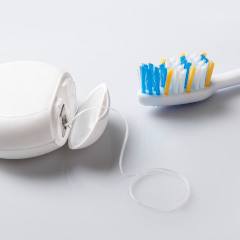
More than 135 million American adults are currently missing at least one tooth. Missing teeth can not only damage your oral health, but your self-confidence as well. Eating can also become significantly more difficult. Consequently, tooth loss may lead to a harmful degree of malnutrition. Thankfully, there are several reconstructive solutions available for patients.
Dental implants are the clear frontrunner because of their natural appearance and the way they revitalize the structure of missing teeth. At Galleria Dentistry, your Naples dentists, Dr. Gery Benza, Dr. Anthony Benza, and Dr. Chelsea Benza provide top-notch dental implant treatment so that people with missing teeth can enjoy an improved quality of life. Contact us today to begin the process of rebuilding your smile with dental implants in Naples!

Dental implants are effective because, unlike traditional bridges or dentures, they actually replicate the entire structure of the tooth beneath the gums, not just the portion that is visible above the gum line.
A titanium post is solidly set in the bone of your jaw. This serves to securely keep your tooth in place. The post also stimulates the jawbone. Without it, the bone tissue can begin to deteriorate and lead to a sunken facial appearance as well as an increased risk of additional tooth loss. A dental implant acts an artificial tooth root, holding the rest of the tooth firmly in position and encouraging new bone growth that keeps your jaw and face looking fuller and younger.
After the implant is placed, a metal attachment called an abutment is put on top of it, which holds your custom-made restoration in place. Your restoration can be a crown, bridge, or denture, depending on how many teeth you’ve lost. Each of these replacement teeth is personalized to resemble the smile you were born with. Because of this, dental implants look – and feel – more natural than any other tooth replacement solution.

Without question, dental implants in Naples are the next best thing to your own teeth. No other replacement option comes close to giving you the same chewing power, longevity, and self-confidence. Not to mention that dental implants can last a lifetime! But, unless you've had the procedure done before, you probably have questions about how the process works. First, it's important to understand that getting implants is done in phases that are spread out over several months. But the payoff is a lifetime of great dental health after tooth loss. Everyone’s dental implant journey looks different, but here’s a basic outline of what to expect:

Dental implants work wonderfully for most people, but we want to make sure you’re a good candidate and talk about your goals beforehand. In addition to having reasonably good overall health, it's important to have adequate bone density in your jaws. However, if you have a thin or weak jawbone, rest assured that there are treatment options such as a bone graft or sinus lift. If necessary, these procedures can be done before getting implants to strengthen the jaw and ensure long-term success.

After the initial consultation and any preliminary procedures have been done, the next step is a small surgery to have the implant placed in your jaw. Dr. Gery Benza and Dr. Anthony Benza are qualified to perform the surgical portion of the process so that you won’t have to be referred to an unfamiliar specialist.
Once the implant has been positioned, we will put a healing cap over it to protect the area for the next several months. The surgery typically takes one to two hours per implant and is generally much easier than people anticipate.

Osseointegration is a process that occurs in the months following your surgery as your implant "fuses" with the surrounding jawbone. This is what gives dental implants such a strong foundation and allows them to function the same way your natural teeth do. On average, osseointegration takes three to six months, but it may require more or less time depending on each patient's needs.
After osseointegration is complete, the healing cap is removed, and an adaptor called an abutment is attached to the implant. This will securely connect the implant to its final restoration.

Depending on how many teeth you're replacing, the last step of your implant procedure is having it restored with a crown, bridge, or denture. While the implant itself takes the place of a missing root, these restorations replace the missing crowns of your teeth to restore both function and appearance. And, with an eye for aesthetics, our team of experienced dentists will make sure your new smile looks fantastic!

Dental implants in Naples have quickly become the preferred solution to treat tooth loss because they offer over a 95% success rate. This is largely due to the materials that are used to replace both the root and crown. Surgically placing a biocompatible, titanium implant post into your jawbone allows you to enjoy various benefits that are not possible with other dental prosthetics, including:

Although there are countless ways dental implants improve your quality of life, here are three reasons roughly 500,000 patients choose this tooth-replacement option each year:

In addition to improving your confidence, dental implants improve your oral and overall health! Here’s how:

Lastly, dental implants come with several long-term benefits, including:
If you’re interested in learning more about the benefits of dental implants compared to the other tooth-replacement solutions available, let us know. We’re here to help!

As the most versatile form of tooth replacement, dental implants can complete your smile in most cases. Provided you have good oral and overall health, we can use dental implants to replace any number of missing teeth:
In the case of a single missing tooth, we can use an implant-retained crown to bring it back to life. Your custom-made porcelain dental crown will attach directly to the implant via a metal connector called an abutment. After this is done, it will feel just like the rest of your natural teeth. The implant will keep it solidly in place, and we’ll design the porcelain so that it perfectly color-matches the rest of your smile.
Dental crowns can also be used to form an implant-retained bridge. Two crowns are placed on implants on either end of the space in a patient’s smile. This helps restore the smile’s appearance, evens out the bite, and prevents the remaining teeth from gradually shifting out of place.
Do you have a denture that you always have to worry about slipping out of place? Is your worst nightmare that it will fall out the next time you’re around friends or family? With implant dentures, we can finally put those fears to rest.
Implant dentures involve a custom-made prosthetic that snaps directly onto multiple implants placed into the mouth. This method of retention gives them a number of advantages compared to a traditional removable prosthetic, such as more reliability, a stronger bite, and easier maintenance.

It is no secret that dental implants cost more than traditional options, like dentures; however, they will eventually pay for themselves. They allow you to make a long-term investment that can last for several decades with the right aftercare, like maintaining your oral hygiene.
When determining how much you can expect to pay for your new smile, there are several things that will influence the price, such as if you need a single unit or a 3-unit bridge. If you need any additional procedures, the price will also increase. During your consultation with your dentist in Naples, we will provide you with an estimate and discuss your payment options.

The types of dental implants that you need will considerably influence the cost of your overall treatment. For a single missing tooth, we can restore your smile with a single implant and a dental crown. If you’re missing teeth consecutively, we will recommend an implant bridge. This custom prosthetic is anchored in place by a dental implant on either side to complete your smile. Lastly, for patients missing all or most of their teeth, an implant denture is the best option. We will use an average of four dental implants to stabilize and support a custom-made denture. The cost for each of these options will increase depending on the number of teeth that you’re missing because of the number of implants and type of restoration required.

The dental implant process has different stages, with each one incurring a separate cost that will contribute to the total price. First, you will come in for a consultation, where we will examine your mouth and recommend the best type of implant-retained restoration for your smile. Then, you’ll have implant surgery, where small incisions will be made in your gums to access your bone and tiny holes are drilled. Once your implants are placed, there is a waiting period of three to six months, which allows your dental implants to integrate into your jaw. Lastly, you’ll come back into our office, where one of our dentists will place your custom-made restoration.

While dental implants may typically come with a higher price tag than other replacement options, they offer benefits that make them well worth the investment. Primarily, dental implants can last a lifetime with proper care, which means less money spent in the future on replacements and adjustments. Additionally, dental implants are the only replacement that preserves the health of your jawbone after tooth loss, which can prevent a myriad of oral health issues. Because of these reasons, dental implants are a great investment that you can enjoy for decades to come.

Unfortunately, most insurance plans don’t cover dental implants. However, your insurance may be able to cover costs associated with the overall process. The initial consultation and treatments required before beginning, like gum disease, may be covered by insurance, but it will all depend on your plan. Our friendly front desk staff is experienced in maximizing your insurance benefits to help you receive quality and affordable dental care. We also offer a payment plan in the form of CareCredit, which allows patients to pay low-to-no interest financing for their new smile.

At Galleria Dentistry, we appreciate the trust you’re putting in us to place your implants properly. However, part of the responsibility for your replacement teeth’s success lies with you and how well you care for your mouth following the procedure. Don’t worry—we’ll give you specific instructions for aftercare to reduce your chances of complication and increase your odds of smooth recovery.

As soon as you leave our office, you must have someone drive you home, where you should rest. In fact, you need to take it easy from laborious tasks or activities for at least 48 hours. Within the first couple of hours, bleeding will slow down and stop, but you may need to swap out your gauze for a clean one. During that time, a blood clot will develop over the site; it is essential that this clot stay there! It will protect your healing gums from harmful bacteria.

While you’re recouping, you may experience these normal symptoms:
These side effects are typical but temporary. Just be patient those first couple of days, and it should get better. However, if you have abnormal symptoms, such as a fever, severe or worsening pain, or something else concerning, contact us immediately.

For the first 24 to 48 hours, you should only have fluids or very soft foods, such as eggs, yogurt, and the like. You may have juice or smoothies, but do not use a straw because sucking can remove the blood clot, which could lead to a painful complication. After this initial timeframe, you can slowly start to reintroduce normal foods back into your diet but try to avoid chewing in the area of the mouth where your implant site is located, especially when you eventually have hard or crunchy foods again.

Unfortunately, oral bacteria don’t care that you’ve just undergone minor surgery and can still strike. As a result, even within the first day of getting the procedure, you need to maintain your oral health. This means you need to gently brush and floss your other teeth while being especially careful around the surgical site.

When you finally get your implant restorations, you will probably feel excited to use them, but you need to be cautious at first. It takes just a little bit of time to get used to biting and chewing with your new teeth, and you don’t want to accidentally bite your tongue or cheek. However, once you get a handle on them, you should be free to enjoy your new teeth! Remember that continued healthy oral habits and hygiene are essential if you want to keep your replacement teeth for as long as possible.

There’s a common misconception that replacement teeth don’t need any care. That’s not the case! In fact, even if your smile is comprised entirely of dental implants, you need to commit to good habits, like coming to our Naples dental office every six months for a dental checkup and cleaning. If you want to learn more on the topic, then give us a call or read on.

Remember, peri-implantitis (a form of gum disease) is one of the leading causes of dental implant failure. That’s one of the many reasons it’s so important that you commit to good oral hygiene habits at home. For example, you should floss each morning or evening in addition to brushing your teeth for a full two minutes twice a day. You should also rinse with an ADA-approved mouthwash so plaque doesn’t build up, the spaces between your teeth get cleaned, and your breath stays fresh.

Hard pretzels, peanut brittle, and candy canes are a few foods that can damage both your teeth and your restoration. That’s why we encourage our patients not to eat anything extremely crunchy or chewy. Instead, we recommend eating lots of nutrient-dense foods, like fresh fruits and vegetables, so your body has everything it needs to keep your jawbone strong and your gums infection-free.

Smoking is often the first thing that comes to mind when people think of bad dental habits. While that’s certainly the case since the use of tobacco products can lead to everything from dry mouth to delayed healing, it’s not the only thing we recommend steering clear of. To keep your dental implants in pristine condition, you should also avoid biting your nails, chewing on ice cubes, and using your teeth as tools to open things.

Although you can’t avoid every dental injury, there are several things you can do to reduce your chances of experiencing one. For example, wear a mouthguard when you play sports! This is important because – without this dental device – your mouth isn’t protected from an accidental elbow to the face, a bad fall, or a rogue ball.

At your biannual visits, your Naples dentist will examine the condition of your dental implants, look for warning signs of gum disease, and screen for oral cancer. They will also answer any questions you have pertaining to your oral health, like which products you should use (and which ones you should avoid) to keep your dental implants in pristine condition.
If we determine that dental implants are the best tooth-replacement option for you, then you can have peace of mind knowing we’re here to help you maintain them too. In other words, we’re here to be an ongoing resource, so don’t hesitate to bring any questions you have to our Naples dental team!

Over the years, our office has gotten many questions on the subject of dental implants. People learn about them for the first time when they come to our office, which is why we’ve decided to include a few common questions we hear from our patients. If your question isn’t listed or you’d prefer to ask in person, feel free to contact our office to set up a consultation! Until then, we hope that our FAQ section helps you gain a better understanding of this revolutionary treatment.
Dental implants are designed to resemble natural teeth as closely as possible. Not only can you eat a far more balanced diet, but you can eat the foods you wouldn’t ever consider with dentures or bridges alone. This includes chewier foods like steak and crunchy foods like apples. Traditional options do not offer this same level of freedom or feel quite as natural because they do not replace the root underneath the gums.
The length of your treatment can vary depending on your specific needs. For example, if you need to have gum disease therapy performed in order to make the placement and healing stages of treatment viable, this will extend the length of your treatment by several months. Furthermore, if you intend on placing multiple implants, more healing time and follow-up visits may be needed before the restoration is placed. On average, you should plan your treatment to take anywhere between two to six months. The best way to determine your projected treatment length is by scheduling an appointment at our office.
The success rate for dental implants averages between 95 and 98 percent when placed by a professional. While the failure rate for implants is extremely low, it is still possible. However, most cases of implant failure are tied to maintaining poor oral hygiene or using tobacco products. In both instances, gum tissue can become infected and unable to hold the prosthetic properly, resulting in peri-implantitis. This is an infection of the gum tissue surrounding the implant.
Dental implants require sufficient bone volume, healthy gum tissue and good oral health overall to be successful. In the event that you do not have sufficient bone volume, a bone graft may be recommended to improve your viability. Bone grafts use donated bone tissue to expand the height, width, and overall volume of your jawbone. After the area bone has healed, we can revisit your case and reevaluate your eligibility.
As long as you commit to daily oral care, attend biannual dental checkups, and avoid tobacco products, there’s no reason your implant shouldn’t last between 25 years and a lifetime. However, you should always treat your implant the same way you would treat your natural teeth. That means brushing twice a day with fluoridated toothpaste, flossing daily, and never using your teeth as a tool. This can easily cause the restoration to crack or make the implant fail due to excessive pressure. Dental implants are strong, but they are not indestructible.